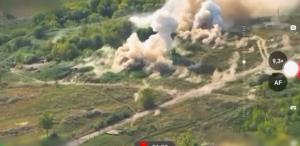Russia’s Flexed Muscles
Like the statues of Atlas near St. Petersburg's Hermitage Museum, Russia is flexing its muscles. Its economy awash in oil and gas profits, the 15-year-old democracy is staking its claim on the world stage…
Transcript
ST. PETERSBURG, Russia - Like the statues of Atlas near St. Petersburg's Hermitage Museum, Russia is flexing its muscles. Its economy awash in oil and gas profits, the 15-year-old democracy is staking its claim on the world stage.
But Russia's new direction has sparked widespread speculation of a new cold war, one that might jeopardize Russia's strategic alliance with its most powerful partner, the United States.
Professor Konstantin Khudoley, dean of St. Petersburg University's School of International Relations, said, "No! The new cold war is impossible."
Khudoley said that American opposition to Russia's membership in the World Trade Organization is just one cause of the political divide.
"Relations between Russia and the United States are now more difficult. From my point of view, differences between the two countries are quite large," he said.
Another source of friction is Russia's retreat from democracy under President Vladimir Putin.
Anna Parachevova, a writer on the state of democracy, says that's a touchy subject for most Russians.
"The U.S. is in a difficult position,” Parachevova said. “There are other issues in which they need Russia: in the war against terrorism, in the Iran crisis, in North Korea. They can't be extremely critical of Russia because they do need them as partner."
It may not be the start of a new cold war, but there's a chill in U.S.-Russia relations. Some analysts see Russian foreign policy as moving away from the West, while others say Russia's just keeping its options open.
What troubles many in the West is Moscow's cozy alliance with nations that President Bush listed in the "Axis of Evil."
Ariel Cohen, a Russian analyst with the conservative Heritage Foundation, said Russia not only has a billion dollar deal to build Iran's Bushehr Nuclear Reactor, it also supports Tehran diplomatically, and supplies Iran with arms.
Cohen said, "Russia is playing a dangerous game in the Middle East when it reaches out to radical Islamist regimes like Iran -- it's reaching to bad actors."
This month, Washington slapped sanctions on Russian defense companies for breaking a u.s. arms embargo on illegal arms to Iran.
“It could be much worse! That's why we're having this dialogue with Putin,” Cohen explained. “We don't want Russia to sell really bad things, nuclear weapons technology, sophisticated anti-aircraft systems, that they are planning to sell, to Iran. …But at the same time, we need Russia in the U.N. Security Council."
But it's unlikely that Russia will back America's call to sanction Iran. Cohen says Russia benefits more from tensions between Iran and the U.S.
"Russia is interested in high oil prices. Therefore, Russia is interested in an aggressive Iran that supports the Middle East. If Americans get pinned down on top of that, dealing with Iran and trying to enforce nuclear disarmament of Iran, that's in Russia's interests because Russia gets stronger. Russia is not involved in any fighting, and Americans are being drained of their treasure and their troops, and are being bogged down in a major confrontation with the Muslim world," Cohen said.
Russia is also talking with Iran about creating a natural gas cartel with Venezuela. Venezuela's anti-American President Hugo Chavez has threatened to cut off oil supplies to the u.s., all bad news for Americans facing higher fuel costs.
Chavez just returned from Moscow where, over u.s. objections, Russia announced a $3 billion deal to sell Caracas fighter jets and military helicopters, making Russia Venezuela's chief arms supplier.
Russia's arms sales to Syria, an issue that surfaced during the latest Lebanon crisis, could threaten Israel, America's key ally in the Middle East. Israeli newspapers reported Russian-made missiles sold to Syria were allegedly passed on to Hezbollah, and used against Israelis troops.
Cohen said, "Russia has what we call in business ‘plausible deniability.’ And I think Russians know full well that some of their weapons sales end up in Hezbollah's hands."
At the recent G-8 Summit, Putin broke ranks with Bush and defended Israel's enemies, refusing to name Syria and Iran as backers of Hezbollah and Hamas. Both are groups that the U.S. considers terrorists and that Russia views as purely political.
Last march, Putin reached out to Hamas, inviting high-level officials to Moscow for talks.
Another alliance raising questions about Russia’s friendship with America is China. Moscow is courting Beijing as customer for its oil and arms. And last year, for the first time, Russia and China conducted joint military exercises.
Anna Aruntunyun with The Moscow News says Russia’s warming relations with its communist neighbor shows a strategy to cultivate alternative allies.
"It wants to maintain a good relationship with China,” said Aruntunyun, “because economically, it's seen as a rising power and it's also seen as a counterbalance to U.S. hegemony."
That counter-balance takes precedence over containing North Korea’s nuclear pursuits. Beijing and Moscow are blocking U.S.-backed sanctions at the U.N. to head off the threat posed by Kim Jong Il.
China is North Korea’s primary benefactor, but the Soviet Union was once Pyongyang’s top aid donor. Today, Bush wants Putin's cooperation to help keep Kim Jong II's finger off the nuclear trigger.
"Remember the coalition of the willing,” Cohen warned. “There's a coalition of the bad, the ugly. Russia and China are interested in keeping North Korea as a major foreign policy irritant for the United States – keep[ing] pressure off themselves and keep[ing] U.S. diplomacy and military forces pinned down in that corner of the world…If one day Kim Jong Il is hung over and pushes a button, then the Russian and Chinese can't stop it."
Russia's leaders insist that they want to keep good relations with Washington. But at the same time, their growing ties with rogue regimes, and their consistent undermining of American interests make Russia seem less and less the reliable ally, and more and more a foe posing as a friend.
Download
Right-click on a link below and choose "Save link as..." to save the file
High Definition - MP4
High Quality - MP4
Low Bandwidth - MP4





